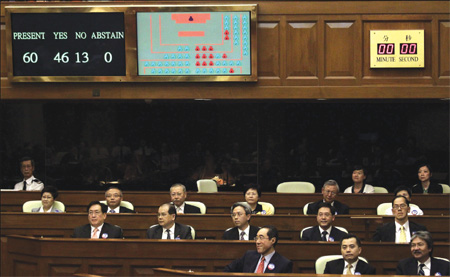Lawmakers approve reform proposals on CE election
Updated: 2010-06-25 07:38
By Joseph Li(HK Edition)
|
|||||||||
|
Chief Secretary for Administration Henry Tang (left, front row) looks confident as the voting results for the government's reform proposals on the election of the Chief Executive in 2012 came out Thursday. With a significant 46-13 majority, as displayed by the overhead electronic panel, lawmakers approved the proposals. Edmond Tang / China Daily |
Voting results on LegCo electoral plan due today; Tang appeals for support
With a significant 46-13 majority, lawmakers Thursday approved the government's reform proposals on the election of the Chief Executive in 2012.
The proposals, which required a two-thirds majority of the 60-member Legislative Council (LegCo), passed with the support of pro-establishment legislators, plus eight crucial votes from the opposition Democratic Party (DP).
Local legislation to accommodate the change in the election law will be ready by October.
As proposed, the size of the Election Committee (EC) that chooses the Chief Executive will increase from 800 to 1,200 members. Each of the four sectors of the EC will have an increase of 100 members.
The proposals are the first part of a package of political reforms on electoral arrangements for the Chief Executive and LegCo elections in 2012.
Lawmakers are scheduled to resume debate this morning on the second part of the reform package, which deals with the amendments to the method for forming the legislature.
Chief Secretary for Administration Henry Tang Thursday expressed his thanks to supporters of the government's Chief Executive electoral arrangements, and urged those against it to change their stance when the second part of the reform package comes to a vote today.
As debate resumed Thursday morning, supporters and opponents of the reform continued to rally outside the buildings where legislators were deliberating. The size of the rallies was much smaller, however, than Wednesday night's turnout for the opening of the debate. Members of the so-called post-1980 generation were especially critical of the DP, demanding that party members justify their support for the compromise proposal that assured passage of the reforms.
In his submission on behalf of the government, Secretary for Justice Wong Yan-lung defended the DP, brushing aside accusations that the opposition party had shaken the principle of "One Country, Two Systems" when it consulted with the Central Government's Liaison Office. The DP communicated with the Central Government in the interest of breaking a crippling deadlock on reform, he said.
He added that he believed most citizens will be happy that an accord was worked out. Wong said it would be unfair to accuse Democratic Party members of losing their integrity and breaking their election pledges.
DP lawmaker Lee Wing-tat said the return of the five new functional constituency seats by 3.2 million voters is by no means a small step. He spoke of the compromise his party had proposed as the means to a de facto direct election. Lee went on to say that the proposal enhances the democratic process in the election of lawmakers. He rejected charges that the DP's shift in position amounted to a betrayal of its principles.
Paul Chan, who represents the accounting constituency, supported the reform, saying he wanted constitutional development to move forward. If the electoral reform was vetoed again, he said, there would be a further tearing off in local society and chaos would ensue.
The Civic Party and the League of Social Democrats (LSD) formed the hardcore opposition to the reform package. The two parties said the reforms did not provide a solid roadmap to universal suffrage and the abolition of functional constituency. The DP broke its election pledge and betrayed the democratic process, said Raymond Wong of the LSD.
China Daily
(HK Edition 06/25/2010 page1)
